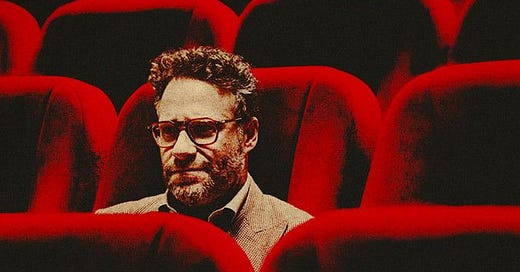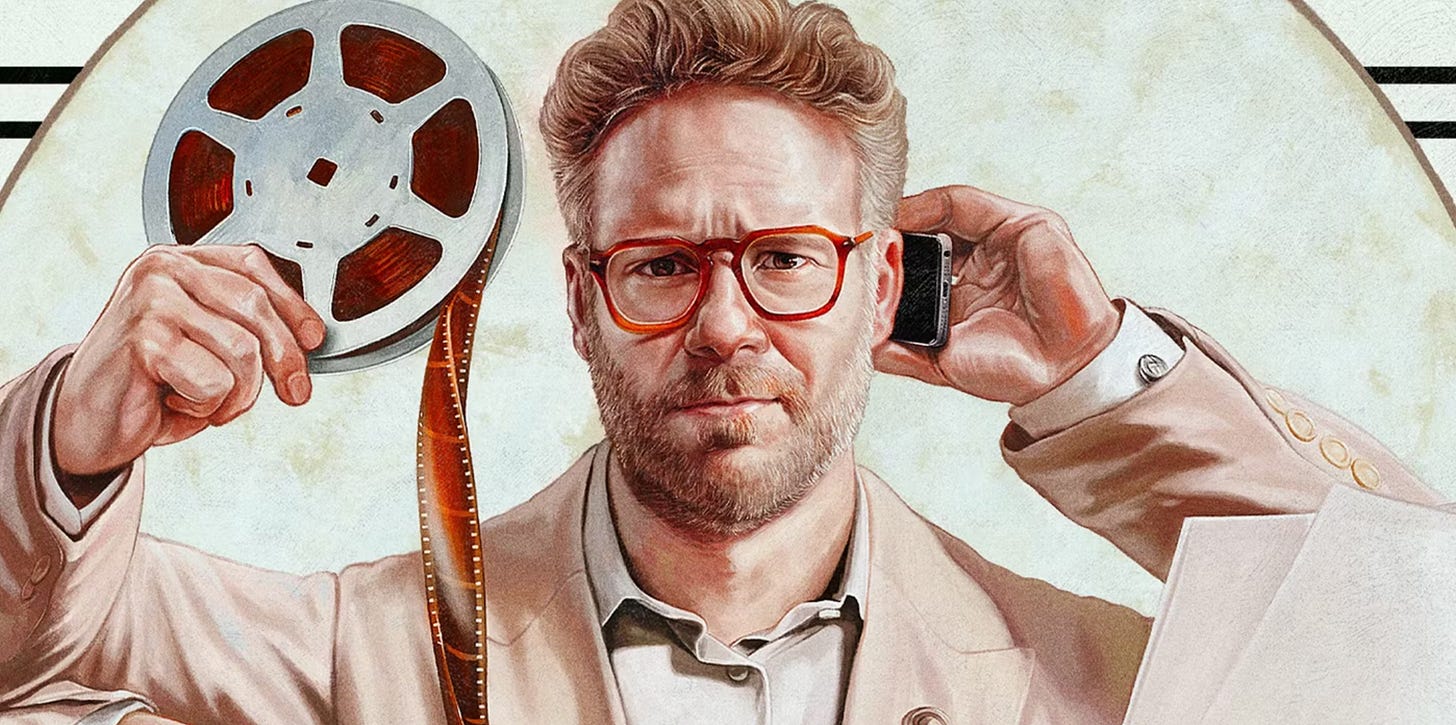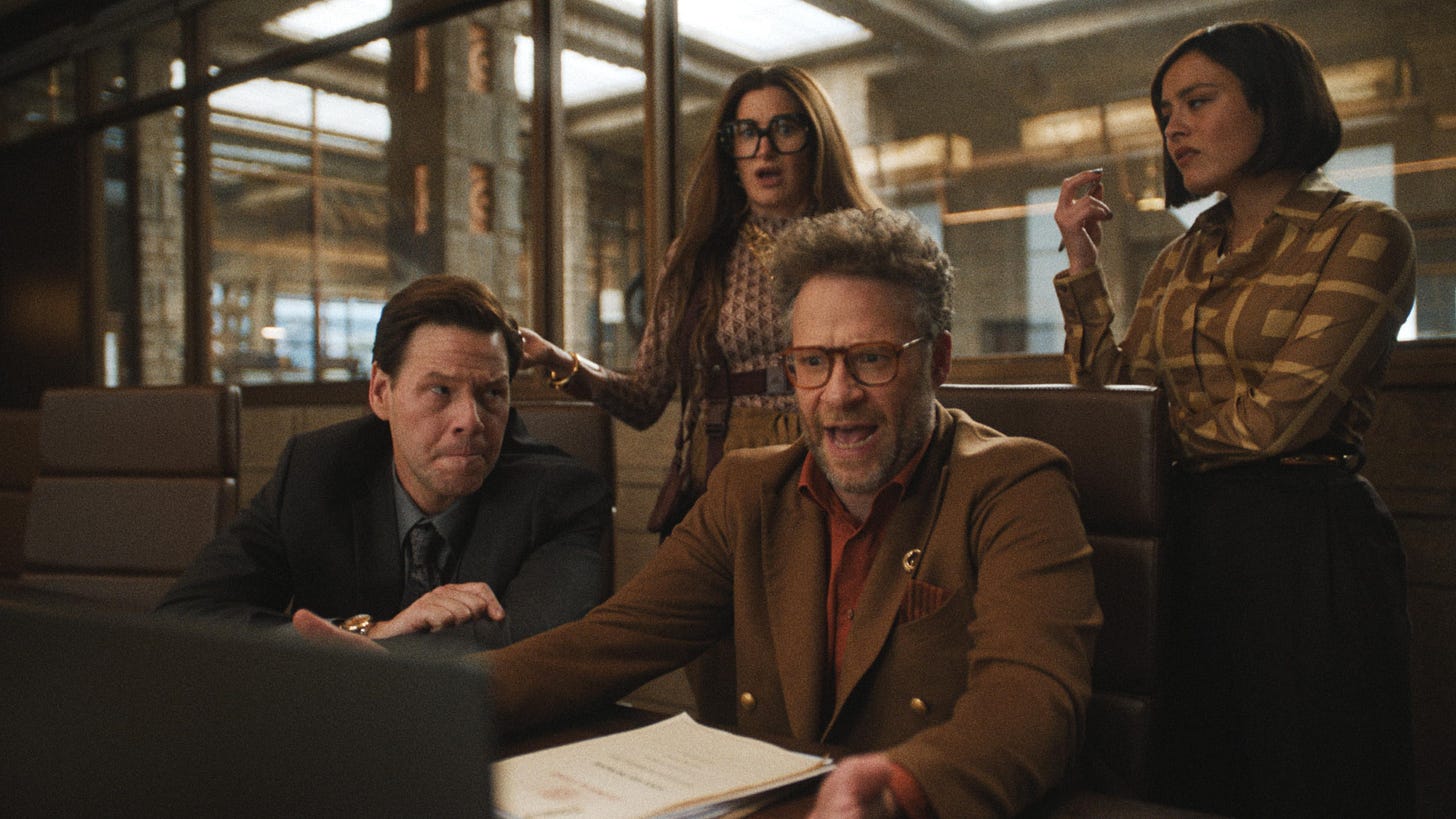A Review of The Studio, or, Apple© Brings Innovation Stagnation to Hollywood
"I'm the only one keeping us from being a thing of the past."
A Message to Our Readers: Despite the focus of this week’s review, The Best Movie Substack remains a newsletter firmly dedicated to the evaluation of movies, not TV shows. The editorial team was initially opposed to commissioning a piece about Seth Rogan and Evan Goldberg’s new Apple+ original series, The Studio, but after several viewings of the pilot episode, it was obvious that an exception needed to be made. In its “satire” of 2020s Hollywood, The Studio presents a too-stupid-to-resist opportunity to interrogate not just the gross creative and intellectual failings that characterize the contemporary entertainment landscape, but also how similar failings have become ascendant in the industrial culture of “Silicon Valley” as typified by the Apple Corporation (AAPL), the show’s financier and distributor.
As Variety recently reported, Apple’s streaming service is losing roughly $1 billion per year peddling its third-rate, thematically incoherent content spew of Severance, Ted Lasso, The Morning Show, et al. What can a willingness to hemorrhage that ungodly amount of cash reveal about the tech world’s intensifying preoccupation with Hollywood? Whose interests does The Studio’s gutless, nothing-risked faux-satire serve, and can delineating the craven rationales of its stakeholders grant us an otherwise inaccessible glimpse of the future of American movies, TV, and tech? At this juncture, we may have to speculate, mostly. There are only two episodes of The Studio available to stream, and The Best Movie Substack hasn’t yet attracted enough paid subscriber pledges to justify an Apple+ subscription. Hopefully it never will.
A Review of The Studio, or, Apple© Brings Innovation Stagnation to Hollywood
The hourlong pilot episode of The Studio, the mercilessly phony Hollywood satire now streaming on Apple+, opens with an appropriately phony sequence: the filming of a phony movie.
In the first of about a dozen cameos, Paul Dano plays a psychotic hitman in a genre movie within the show, tossing off telegraphed lines that will later be repeated within the behind-the-scenes “reality” of the show. (You know, because life imitates content.) “I’m the only one keeping us from being a thing of the past!” Dano’s character moans to a fellow criminal as he bleeds to death, presumably alluding to the threats posed to organized crime by advances in criminology and surveillance. If there is an elegant or honest moment in the pilot, it’s how unsubtle the subtext is here: The Studio is the Apple corporation—and Silicon Valley writ large—writing a weekly blackmail-letter-posing-as-a-love-letter to Hollywood. Either take our blood money, the letter says, or become a thing of the past.
In case there’s any doubt that The Studio primarily exists as a front for Apple’s underperforming streaming platform to distribute favor-currying checks to an anxious set of actors and filmmakers in post-pandemic, post-strike, post-wildfires Hollywood, the pilot also features appearances from Peter Berg, Nick Stoller, Martin Scorsese, Charlize Theron, and Steve Buscemi. The episode revolves around Matt Remick, Seth Rogan’s newly minted studio head, whose cartoonishly greedy boss has tasked him with making a Barbie-esque IP movie about Kool-Aid. This setup, in practice, turns the pilot into a native advertising vehicle for the red powdered drink. (Too clever by half? Oh, no.)
Rounding out the cast are memed-to-death Tinseltown treasures like Bryan Cranston (Breaking Bad), Catherine O’Hara (Schitt’s Creek), and Kathryn Hahn (I Love Dick). As they shout “Kool-Aid” at each other every 12 seconds, you can almost hear the pitch that was delivered to Tim Cook in Palo Alto: “The Studio is like prestige TV Entourage for the 2020s!” The episode is literally titled “The Promotion,” and there is insufficient self-awareness or self-respect on display to claim that anybody involved gleans the double meaning.
The askew vision of Hollywood promoted by The Studio is more or less the cliched tale of The Town’s artistically minded minority having to compromise their talent, integrity, and “love of the movies” in exchange for a fleeting, measly stake in the profit-hungry industry’s century-long race to the bottom. However, unlike superior comps like The Player, Barton Fink, and It’s Gary Shandling’s Show, The Studio is too much of a compromised-in-conception artistic product for any of its critiques to feel transgressive or sincere, and worse, it remains too droolingly reverent of its satirical target for the insights or characterizations to surprise or bite. As Rogan’s down-on-her-luck mentor puts it from her mansion overlooking LA, 99% of movies may suck, but “…when it all comes together, and you make a good movie, it’s good forever.”
As readily falsifiable as that statement may be, it does invite the viewer to consider the countless factors that used to come together to make actual cinema, then compare and contrast them with the precarious workers and unforgiving metrics that exist in perpetual conflict in the streaming era. What happens when the worst inclinations of Hollywood and Silicon Valley come together not to produce a movie at all, but a mediocre TV show formalizing a shallow fantasy of “the movie biz,” a show whose most notable ability resides in using derivative cinema aesthetics, like single takes, to disguise its badness? What will happen to movies when Netflix, Amazon, Disney, and Apple are the only studios left in town?
Answering these questions remains somewhat difficult, because the segmented POV of The Studio depends on conveniently overlooking several present-day truths in The Biz. Take, for instance, the involvement of writer-director Martin Scorsese, who plays an exaggerated version of himself in “The Promotion.” Within the framework of The Studio, the most grievous sin imaginable is to betray Scorsese—and therefore auteurist cinema—as Matt Remick does, by buying Scorsese’s script only to kill it and avoid any corporate sponsorship conflicts of interest. But this situation masks how Scorsese really has been wronged by 2020s Hollywood: One of the worst films he has ever made, Killers of the Flower Moon, was produced by Apple. In this way, again and again, The Studio misunderstands itself, the industry it centers, and its main character. Come on: real cinephiles are rewatching After Hours, The Aviator, or Age of Innocence ten times each before they’re ever popping open the Blu-Ray of Goodfellas.
Hollywood has long been an industry obsessed with its own stagnation, but the involvement of Silicon Valley in The Studio suggests that tech, once the jewel in the crown of the American economy, is begrudgingly wakening to its own inevitable obsolescence. Interest rates, in multiple senses of the term, aren’t what they used to be in the 2010s, and where are the intrepid visionary entrepreneurs that new and old media spent every post-2008 year training our society to worship? Mark Zuckerberg does karate, and renamed Facebook after the Metaverse, perhaps the single biggest failure in the history of personal computing. Jeff Bezos handed his ex-wife $160 billion so he could date a latex gargoyle, and when Tim Cook isn’t donating $1 million to Donald Trump’s inauguration, he’s launching innovations like the Apple card. Your smartphone looks like it did ten years ago, and if there are any changes, it’s that the hardware breaks faster and costs more monetarily and psychologically.
So, maybe Hollywood and tech are a perfect pairing, two strung-out has-beens who, rather collapse under their own weight, can stay upright longer by leaning against each other. From this vantage, Seth Rogan is the ideal partner for Apple’s morally confused and financially wasteful foray into the streaming wasteland. Who better to signify what is still just and beautiful in the corrupt town of LA than the blowhard who lectures lowbies on Twitter, and, in a city beset by a homelessness crisis, partners with AirBnB and buys second properties to display his pottery and ashtray collection? As it is in San Francisco, so it is in Los Angeles; The Studio conditions us to look past that ugly suffering to concentrate on the prettified suffering that really matters: the workplace frustrations of the professional managerial class.
Forget Severance. If Apple wants to stage a meaningful critique of a corrupt industry or a soulless workplace, it should set a prestige TV series in the Foxconn factories where iPhones are produced, the factories where, infamously, so many employees try to kill themselves that the owners were forced to install “sucide nets” around the buildings. Apple’s coders and developers could even include a plug-in for the Apple Vision Pro, which would let viewers experience firsthand what it’s like to swandive off a roof in Longhua. Now that’s one space where Hollywood and Silicon Valley both continue to innovate: They keep finding new ways to make people want to kill themselves.







So true. I tried to watch three episodes of this show and it made me feel ill, I can’t stand Seth Rogen and the whole thing is cringe celebrity ass kissing. Every single show Apple makes is sterile and misses the mark in one way or another.